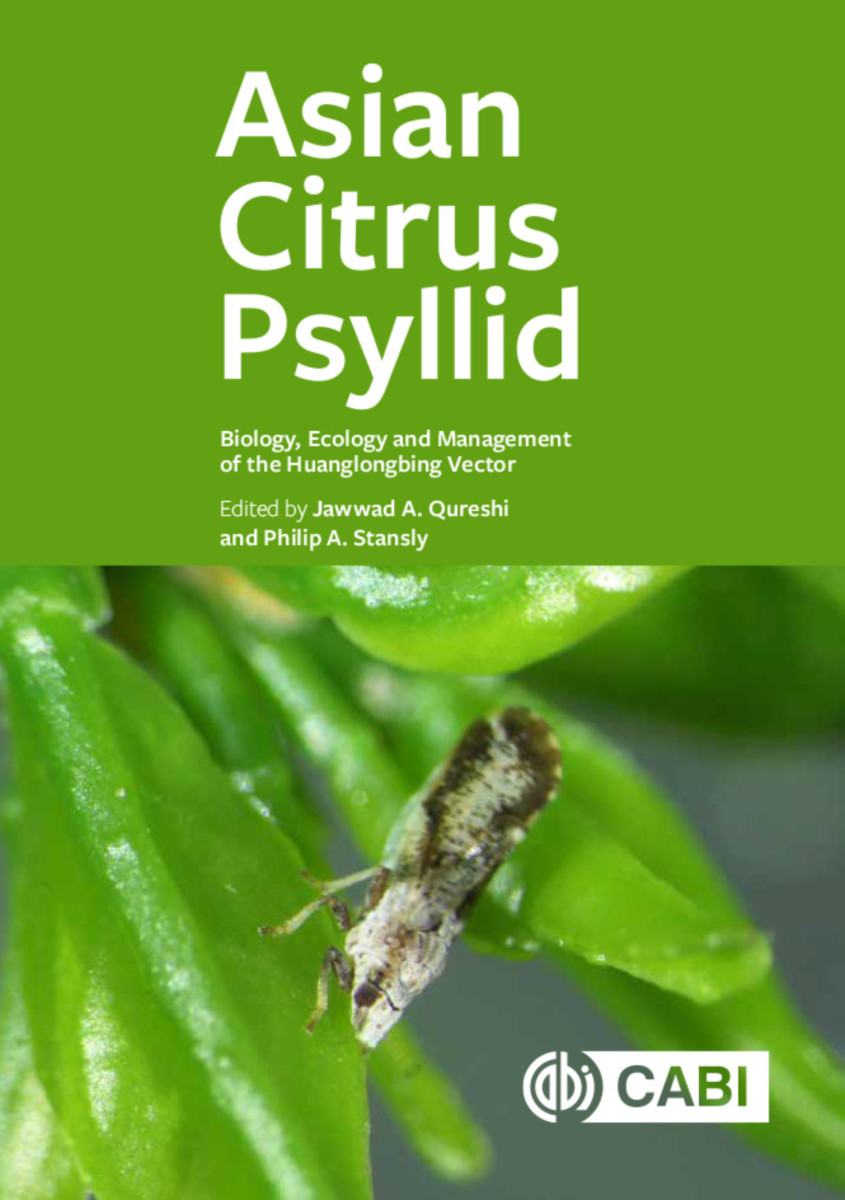Asian Citrus Psyllid
Biology, Ecology and Management of the Huanglongbing Vector
- Publisher
CABI - Published
3rd August 2020 - ISBN 9781786394088
- Language English
- Pages 352 pp.
- Size 6" x 9"
Asian citrus psyllid (ACP), Diaphorina citri, is an insect pest which transmits a bacterium, Candidatus liberibacter asiaticus (Clas), through newly emergent foliage of citrus trees. This causes a disease known as Huanglongbing (HLB), which has become the most debilitating and intractable disease in citrus crops.
This book, written by a team of experts on the Asian citrus psyllid, gathers together everything currently known about the biology and ecology of this important pest species, examines the transmission and acquisition processes of the pathogen, and looks at current management practices and their effectiveness. The potential for new, innovative management techniques are also described along with the economic implications of managing this rapidly establishing disease.
1: Asian citrus psyllid life cycle and developmental biology
2: Functional anatomy of the Asian citrus psyllid
3: Mating behaviour of the Asian citrus psyllid
4: Visually and chemically guided behavior of the Asian citrus psyllid
5: Hosts of the Asian citrus psyllid
6: Abiotic and Biotic Regulators of the Asian Citrus Psyllid Populations
7: Symbionts and pathogens of the Asian citrus psyllid
8: Huanglongbing Pathogens: Acquisition, Transmission and Vector Interactions
9: Epidemiology of huanglongbing: Implications of infective colonization events
10: Sampling and Economic Thresholds for Asian citrus psyllid
11: Management Objectives and Integration of Strategies for the Asian Citrus Psyllid
12: Management of Diaphorina citri in Asia
13: Asian Citrus Psyllid Management in Sao Paulo, Brazil
14: Integrated Management of Asian Citrus Psyllid and Huanglongbing in Florida: Past, Present and Future
15: Area-wide management of Asian citrus psyllid in Texas
16: Management of Asian citrus psyllid in California
17: Advances in RNA suppression of the Asian Citrus Psyllid Vector and Bacteria (Huanglongbing Pathosystem)
Jawwad A. Qureshi
Dr. Jawwad A. Qureshi is Assistant Professor of Horticultural Entomology at University of Florida/IFAS, Entomology and Nematology Department, Indian River Research and Education Center, Fort Pierce, Florida. He has worked on citrus pest management, particularly Asian citrus psyllid, for more than 10 years developing tools and tactics needed for sustainable production systems. His tap sampling method and work on the dormant winter sprays of broad spectrum insecticides were adapted by industry as part of area-wide psyllid management programs. Dr. Qureshi also served as Team Leader for The Center of Agriculture and Biosciences International and earned his doctorate at Kansas State University. He was named Entomologist of the Year by Florida Entomological Society and received other national and international awards. He works in fruits, vegetables and field crops and teaches and mentors graduate students. He has published 2 book chapters, 50 refereed research articles and more than 100 extension, outreach and industry articles.
Philip A. Stansly
Dr. Philip A. Stansly is Professor of Entomology, University of Florida Department of Entomology & Nematology and Southwest Florida Research & Education Center (SWFREC), Immokalee, Florida. Master’s degree University of Oklahoma (1978), thesis on use of lady beetles to combat armored scale in date groves of Northern Niger (West Africa). Ph.D. in Entomology (1984), dissertation on the ecology of the boll weevil on native host plants in Tabasco (SE) Mexico. Post-doctoral associate for the State University of New York at Stony Brook (1985-1986), studying the ecology of mound-building, nasute termites in the llanos of Venezuela. Joined the UF-IFAS faculty in 1986 to head implementation IPM with row-crop farmers of Coastal Ecuador. Manages a program of research and extension at SWFREC since 1989 on IPM of pests affecting citrus and vegetables with focus on Diaphorina citri and Bemisia tabaci respectively. Mentors graduate students and is author or co-author of over 550 entomological publications including 1 book, 7 book chapters, 129 refereed and 85 non refereed papers, 142 trade journal and extension publications and 196 Arthropod Management Test reports. Awards include the Florida Entomological Society Achievement Award for Extension (1995, 1999) and the University of Florida Davidson Productivity Award (2002).


